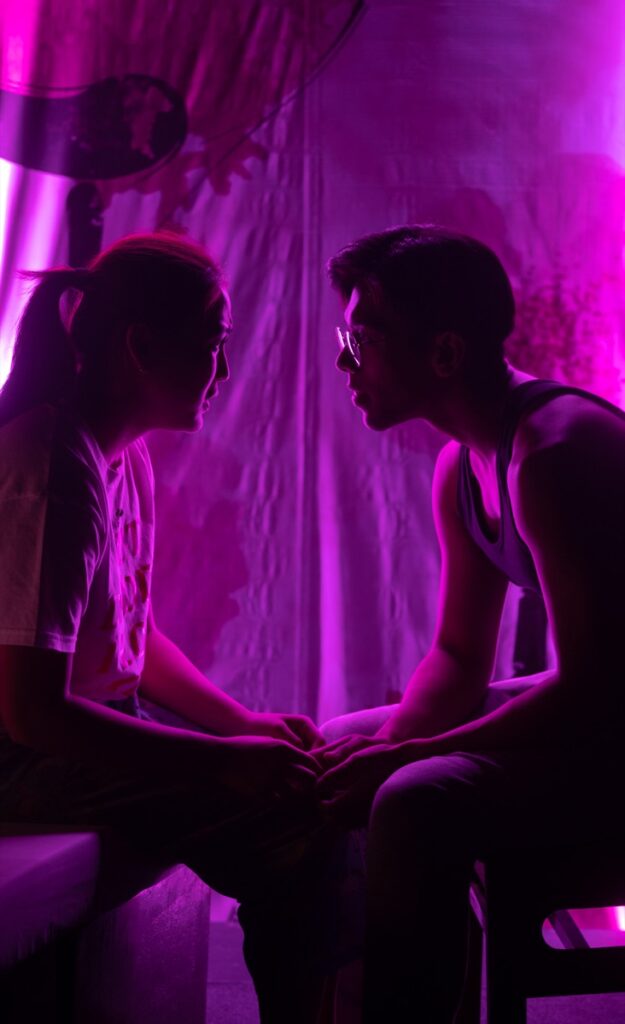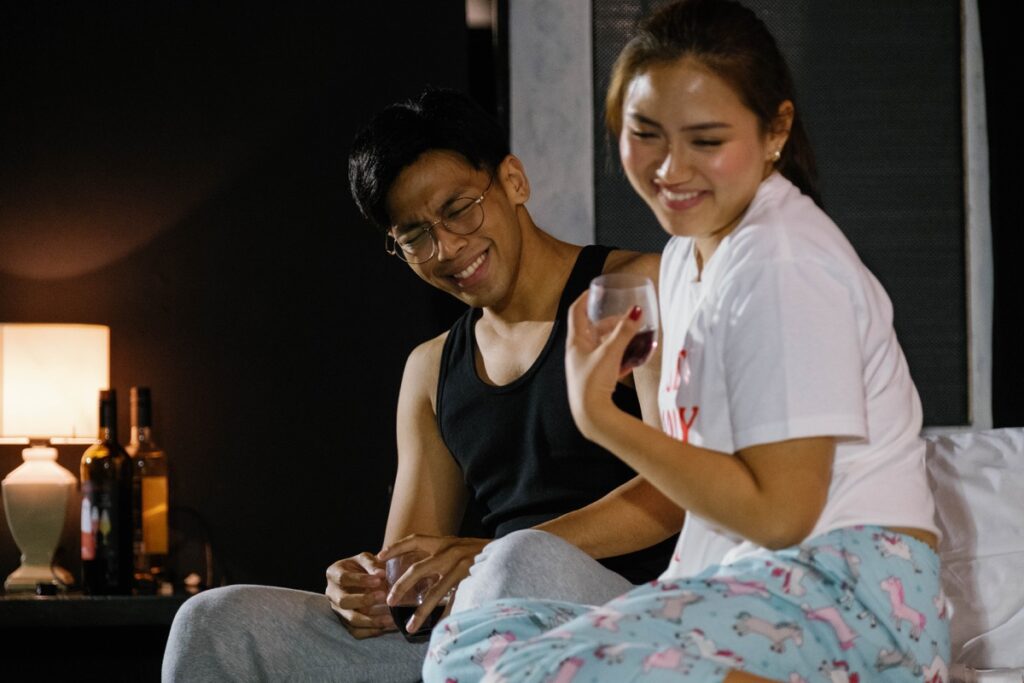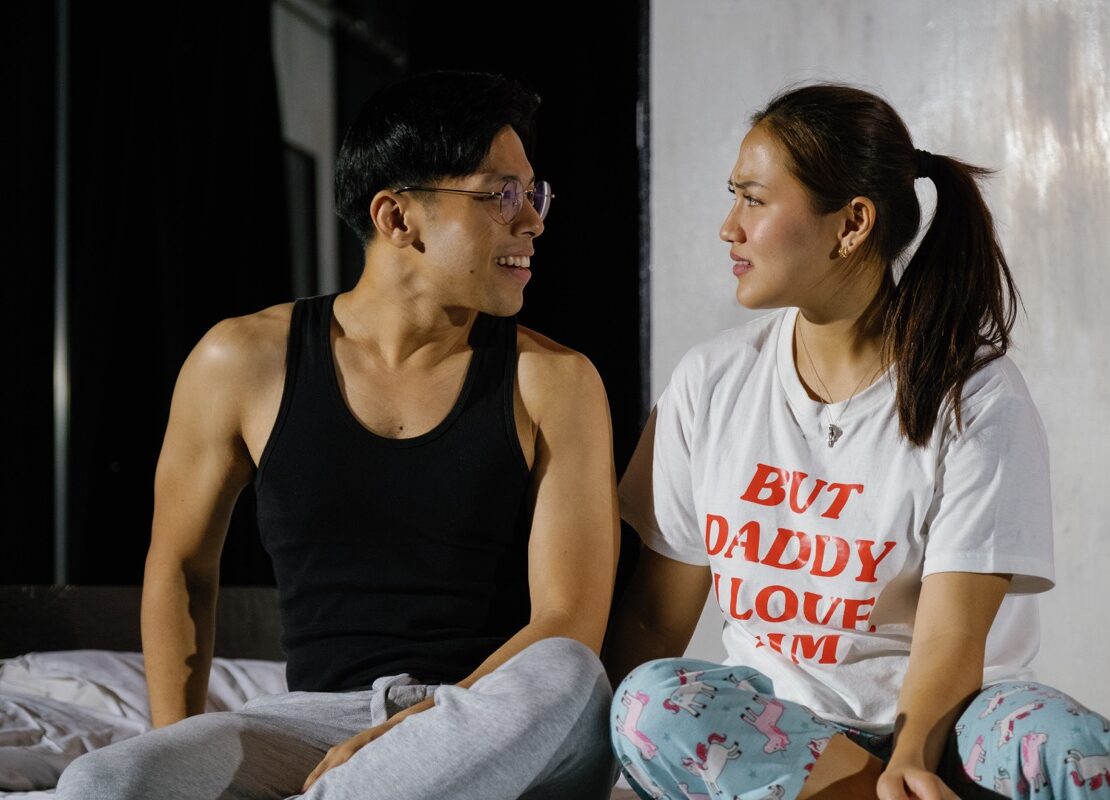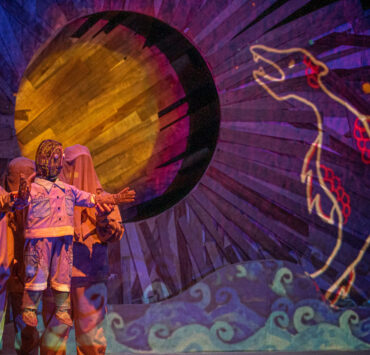It takes a lot of care, courage, and insight to (re)tell a story that has been told, posted, passed around, and staged numerous times over two decades. To be able to do so in a way that makes it feel as relatable as it was when it was first staged is a mark, for this writer at least, of both a timeless story and an inspired storyteller.
I think such is the case in Theatre Titas’ 20th anniversary staging of Juan Ekis’ “Twenty Questions.”
What’s even more fascinating is that this is the second run of this 20th anniversary version of the piece. Having seen both, first in May, and recently this November, it’s become even tighter, and even more engaging for the current generation of theater-goers.
“Twenty Questions” directed by Luis “Cheese” Mendez of Theatre Titas still stays true to the core of Ekis’ story: Two friends, Yumi (Isabelle Prado) and Jigs (Diego Aranda), are the (un)lucky members of their barkada who have fallen victim to their group’s annual tradition of putting one girl and one boy in a room together for 24 hours. The irony is that this was all Yumi’s idea years ago—with the goal of setting up two of their friends. Being on the receiving end of this forced proximity treatment, Yumi (and reluctantly Jigs) has decided they would be the barkada’s first failures. They set out to be the first pair who would not emerge from their 24-hour lockdown in love. But of course, to make the next few hours more exciting, perhaps spicy, and ultimately less boring, the two decide to play a game of twenty questions—each one taking turns to ask the other questions that must be answered with utmost honesty. And, all this over bottles upon bottles of booze.
Honestly, although Jigs and Yumi were dedicated to being the tradition’s first “failures,” their only failure was to themselves. They set themselves up to develop feelings, please.

That’s the thrill of this whole piece, being a voyeur into the intimate conversation taking place in this locked room, watching as these two people, seemingly polar opposites, carefully strip layer after layer of themselves. We join in their journey of discovering each other, delving into their histories and their thoughts; we too, get to know them, and in turn, a bit of ourselves, too.
What also makes this version of “Twenty Questions” so engaging is that aside from the intriguing time-tested script and the intimate setting, it’s also peppered with so many references that really make you believe that this is a story of today. From references to the newly released sensual tunes of BTS’ Jungkook and viral Tiktok hits, to the now-ubiquitous Relx, Jigs and Yumi—who were first born on the page 20 years ago—become a Jigs and Yumi of 2023, or rather, they could be you and me, of the year 2023.
And while “Twenty Questions” is obviously romantically charged, with a chunk of it dealing with matters of sex and physical intimacy, chastity, and relationships, I also like thinking about “Twenty Questions” in the context of connections and friendships in general. Humans relating to other humans.
Or I guess this just speaks a bit of my current phase in my personal life when I say that more than the undeniable kilig and sexual tension between the two characters (sana all!) as the questions progress and more wine is consumed, I found myself equally attached to the idea that these two young adults—friends—are having an intimate conversation.

Of course the circumstances are far from ordinary, but hear me out: Who’s to say we have to get stuck in a room with a friend just to have these kinds of conversations? What’s stopping us (or me, really) from asking friends out to drink and asking them if they think sex is the same as making love, or if the act even equates to love at all. Or to even probe if we can really say we’ve been in love at all. Or just talk about something as “boring” as what their current greatest frustrations are, or what they would want to be if they could be anything else.
I think of the game “We’re Not Really Strangers” prompting us to ask and think about things we normally probably would not talk about. Questions we wouldn’t think of in an ordinary conversation, like, “What do you crave more of?” or “What’s a compliment you wish you received more frequently?” or “Have you ever told someone ‘I love you,’ but didn’t mean it?” Or even just “how are you, really?”
What’s beautiful about “Twenty Questions’” setup and story is that although they were put there against their will, and although they decided to make a game out of it, they were able to transform it into a safe space. I think that’s what they (and we) really needed—a safe space to let themselves be heard and understood. When Yumi was talking about wanting her soul to be touched like a violinist stroking his instrument’s strings—it was very much an expression of the need for deeper intimacy, one that also required a sense of safety for “the soul to make music,” so to speak.
It was also refreshing to listen to Jigs—as I’m sure Yumi also found. His views and ideals may be deemed unconventional, especially in this era, but it’s delightful to know (or at least hope that) there are men like Jigs. Plus the gentleness and care with which he dealt with Yumi and her story was nothing short of admirable. Nolisoli content creator Andreiana Yuvallos, with whom I went to see the most recent staging, and I both agreed, in all positivity and hopefulness: May Jigs pa ba sa mundo? We want a Jigs, too.
Looking at Jigs and Yumi—two friends who have known each other for quite a while—and really thinking about how their rally of questions turned out, proves at least to me, that you only truly get to know someone when you take the time to talk to them, listen to them, and be genuinely curious about them. Even of their dark, secret sides.
You can know someone for a long time, be friends for a long time even, and not really know much about them. But only when you take the time to be curious, to open yourself up to being vulnerable and to receive their vulnerability in turn, can you truly connect better.
For someone like me who’s been craving for deeper connections, “Twenty Questions” couldn’t have come at a better time. And though the run may be over, I think I’ll be carrying these questions with me for a while. Locked room not required.




